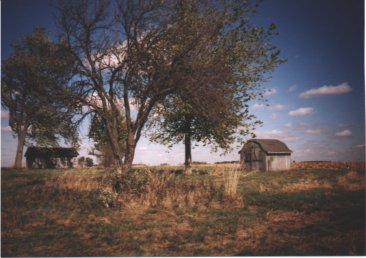
when the wagon is empty of me again it will go on for a half mile with me still in it
The sister-in-law told the brother. Then he remarked her changing shape,
which he should have noticed some time before. He was a hard man. Softness
and gentleness and youth (he was just forty) and almost everything else
except a kind of stubborn and despairing fortitude and the bleak heritage
of his bloodpride had been sweated out of him. He called her whore. He
accused the right man (young bachelors, or sawdust Casanovas anyway, were
even fewer in number than families) but she would not admit it, though the
man had departed six months ago. She just repeated stubbornly, "He's
going to send for me. He said he would send for me"; unshakable,
sheeplike, having drawn upon that reserve of patient and steadfast
fidelity upon which the Lucas Burches depend and trust, even though they
do not intend to be present when the need for it arises. Two weeks later
she climbed again through the window. It was a little difficult, this
time. 'If it had been this hard to do before, I reckon I would not be
doing it now,' she thought. She could have departed by the door, by
daylight. Nobody would have stopped her. Perhaps she knew that. But she
chose to go by night, and through the window. She carried a palm leaf fan
and a small bundle tied neatly in a bandanna handkerchief. It contained
among other things thirtyfive cents in nickels and dimes. Her shoes were a
pair of his own which her brother had given to her. They were but slightly
worn, since in the summer neither of them wore shoes at all. When she felt
the dust of the road beneath her feet she removed the shoes and carried
them in her hand.
She has been doing that now for almost four
weeks. Behind her the four weeks, the evocation of far is a
peaceful corridor paved with unflagging and tranquil faith and peopled
with kind and nameless faces and voices: Lucas Burch? I dont
know. I dont know of anybody by that name around here. This road? It goes
to Pocahontas. He might be there. It's possible. Here's a wagon that's
going a piece of the way. It will take you that far; backrolling
now behind her a long monotonous succession of peaceful and undeviating
changes from day to dark and dark to day again, through which she advanced
in identical and anonymous and deliberate wagons as though through a
succession of creakwheeled and limpeared avatars, like something moving
forever and without progress across an urn.
The wagon mounts the hill toward her. She passed
it about a mile back down the road. It was standing beside the road, the
mules asleep in the traces and their heads pointed in the direction in
which she walked. She saw it and she saw the two men squatting beside a
barn beyond the fence. She looked at the wagon and the men once: a single
glance allembracing, swift, innocent and profound. She did not stop; very
likely the men beyond the fence had not seen her even look at the wagon
nor at them. Neither did she look back. She went on out of sight, walking
slowly, the shoes unlaced about her ankles, until she reached the top of
the hill a mile beyond. Then she sat down on the ditchbank, with her feet
in the shallow ditch, and removed her shoes. After a while she began to
hear the wagon. She heard it for some time. Then it came into sight,
mounting the hill.
The sharp and brittle crack and clatter of its
weathered and ungreased wood and metal is slow and terrific: a series of
dry sluggish reports carrying for a half mile across the hot still
pinewiney silence of the August afternoon. Though the mules plod in a
steady and unflagging hypnosis, the vehicle does not seem to progress. It
seems to hang suspended in the middle distance forever and forever, so
infinitesimal is its progress, like a shabby bead upon the mild red string
of road. So much so is this that in the watching of it the eye loses it as
sight and sense drowsily merge and blend, like the road itself, with all
the peaceful and monotonous changes between darkness and day, like already
measured thread being rewound onto a spool. So that at last, as though out
of some trivial and unimportant region beyond even distance, the sound of
it seems to come slow and terrific and without meaning, as though it were
a ghost traveling a half mile ahead of its own shape. 'That far within my
hearing before my seeing,' Lena thinks. She thinks of herself as already
moving, riding again, thinking Then it will be as if I were
riding for a half mile before I even got into the wagon, before the wagon
even got to where I was waiting, and that when the wagon is empty of me
again it will go on for a half mile with me still in it She
waits, not even watching the wagon now, while thinking goes idle and swift
and smooth, filled with nameless kind faces and voices: Lucas
Burch? You say you tried in Pocahontas? This road? It goes to Springvale.
You wait here. There will be a wagon passing soon that will take you as
far as it goes Thinking, 'And if he is going all the way to
Jefferson, I will be riding within the hearing of Lucas Burch before his
seeing. He will here the wagon, but he wont know. So there will be one
within his hearing before his seeing. And then he will see me and he will
be excited. And so there will be two within his seeing before his
remembering.'